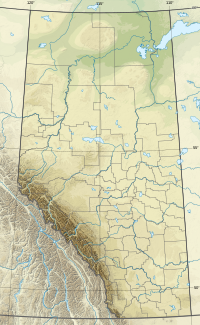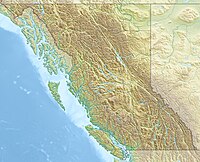Mount Foch is a 3,194-metre (10,479-foot) mountain summit located on the border of Alberta and British Columbia on the Continental Divide.[4] It was named in 1918 after Marshal Ferdinand Foch.[3][1]
| Mount Foch | |
|---|---|
 Mounts Foch and Sarrail | |
| Highest point | |
| Elevation | 3,194 m (10,479 ft)[1] |
| Prominence | 384 m (1,260 ft)[1] |
| Parent peak | Mount Pétain (3196 m)[1] |
| Listing | |
| Coordinates | 50°34′22″N 115°09′22″W / 50.57278°N 115.15611°W[2] |
| Geography | |
| Country | Canada |
| Provinces | Alberta and British Columbia |
| Parent range | Park Ranges[1] |
| Topo map | NTS 82J11 Kananaskis Lakes[2] |
| Climbing | |
| First ascent | 1930 Katie Gardiner, Walter Fuez[3] |
The first ascent of the mountain was made in 1930 by Kate (Katie) Gardiner and Walter Feuz.[1] The duo also made the first ascents of nearby Mount Sarrail and Mount Lyautey that same year.[3]
It was named in 1918 after Marshal FerdinandFoch.[5]
Geology
editMount Foch is composed of sedimentary rock laid down during the Precambrian to Jurassic periods. Formed in shallow seas, this sedimentary rock was pushed east and over the top of younger rock during the Laramide orogeny.[6]
Climate
editBased on the Köppen climate classification, Mount Foch is located in a subarctic climate with cold, snowy winters, and mild summers.[7] Temperatures can drop below −20 C with wind chill factors below −30 C. In terms of favorable weather, June through September are the best months to climb Mount Foch.
Gallery
edit-
Lower Kananaskis Lake with Mount Foch and Sarrail
See also
editReferences
edit- ^ a b c d e f "Mount Foch". Bivouac.com. Retrieved 2018-12-15.
- ^ a b "Mount Foch". Geographical Names Data Base. Natural Resources Canada. Retrieved 2021-01-24.
- ^ a b c "Mount Foch". cdnrockiesdatabases.ca. Retrieved 2021-01-24.
- ^ PeakVisor. "Mount Foch". PeakVisor. Retrieved 2024-11-18.
- ^ PeakVisor. "Mount Foch". PeakVisor. Retrieved 2024-11-18.
- ^ Gadd, Ben (2008), Geology of the Rocky Mountains and Columbias
- ^ Peel, M. C.; Finlayson, B. L.; McMahon, T. A. (2007). "Updated world map of the Köppen−Geiger climate classification". Hydrol. Earth Syst. Sci. 11: 1633–1644. ISSN 1027-5606.
External links
edit- Media related to Mount Foch at Wikimedia Commons
- Mount Foch weather: Mountain Forecast
- "Mount Foch". BC Geographical Names.

